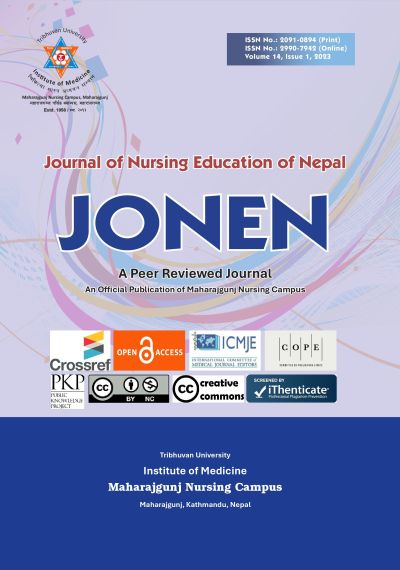Knowledge, Attitude and Practice regarding Cervical Cancer Screening among Married Women Attending in a Tertiary Hospital
Keywords:
Attitude, Cervical Cancer, Knowledge, Practice, ScreeningAbstract
Introduction: Globally, cervical cancer is a serious burden on reproductive health of women which is preventable through early detection. The objective of this study was to find out the knowledge, attitude, and practice regarding cervical cancer screening among the married women.
Methods: Descriptive cross-sectional research was conducted in Tribhuvan University Teaching Hospital (TUTH). Non-probability purposive sampling technique was adopted. Data was collected using a structured interview questionnaire among 195 respondents from Gynae OPD. Data analysis was done by descriptive and inferential statistics.
Results: More than two third of the respondents (67.7%) had adequate knowledge regarding cervical cancer screening, 60% had inadequate practice and all the respondents had positive attitudes of screening. Most of the respondents (86.2%) said that having multiple sexual partner followed by sexually transmitted infection (84.1%) & multiparty (75.4%) were the causes and 84.6% stated that increased vaginal discharge, post-menopausal bleeding (79.5%) and irregular menstruation (67.2%) were the symptoms of cervical cancer. Almost all respondents (97.4%) said that early screening as preventive measures. The level of knowledge tends to be associated with age of the respondents and their socio-economic status (p=<0.05) whereas in practice, there was no association between selected variables.
Conclusion: Although respondents had adequate knowledge and positive attitude on cervical cancer and its screening, less than half of the respondents only practice Pap smear test as screening. The level of knowledge tends to be significantly associated with age of the respondents and their socio-economic status.
Downloads
Downloads
Published
How to Cite
Issue
Section
License
Copyright (c) 2023 Journal of Nursing Education of Nepal

This work is licensed under a Creative Commons Attribution-NonCommercial 4.0 International License.
This license enables reusers to distribute, remix, adapt, and build upon the material in any medium or format for noncommercial purposes only, and only so long as attribution is given to the creator.




